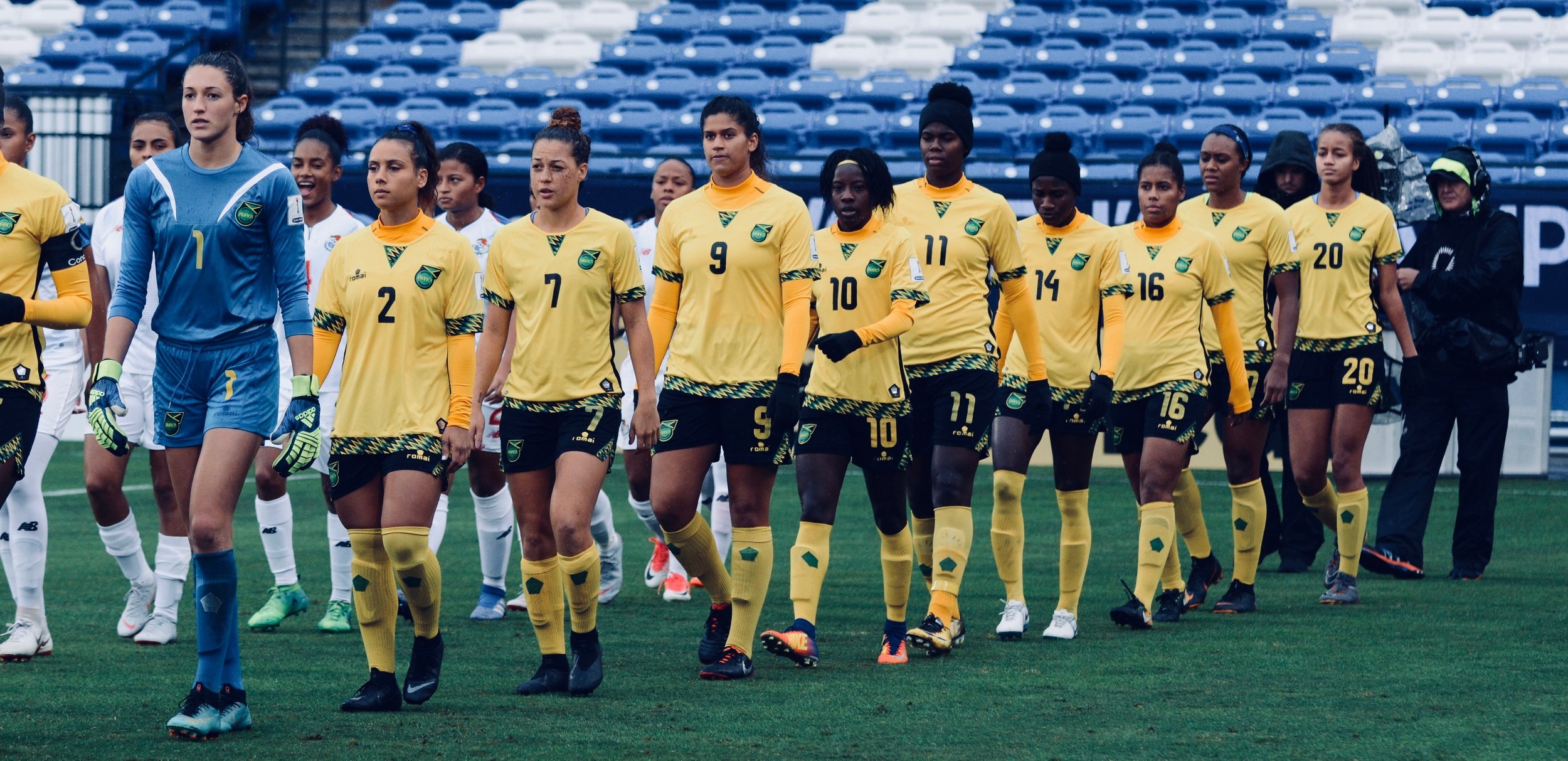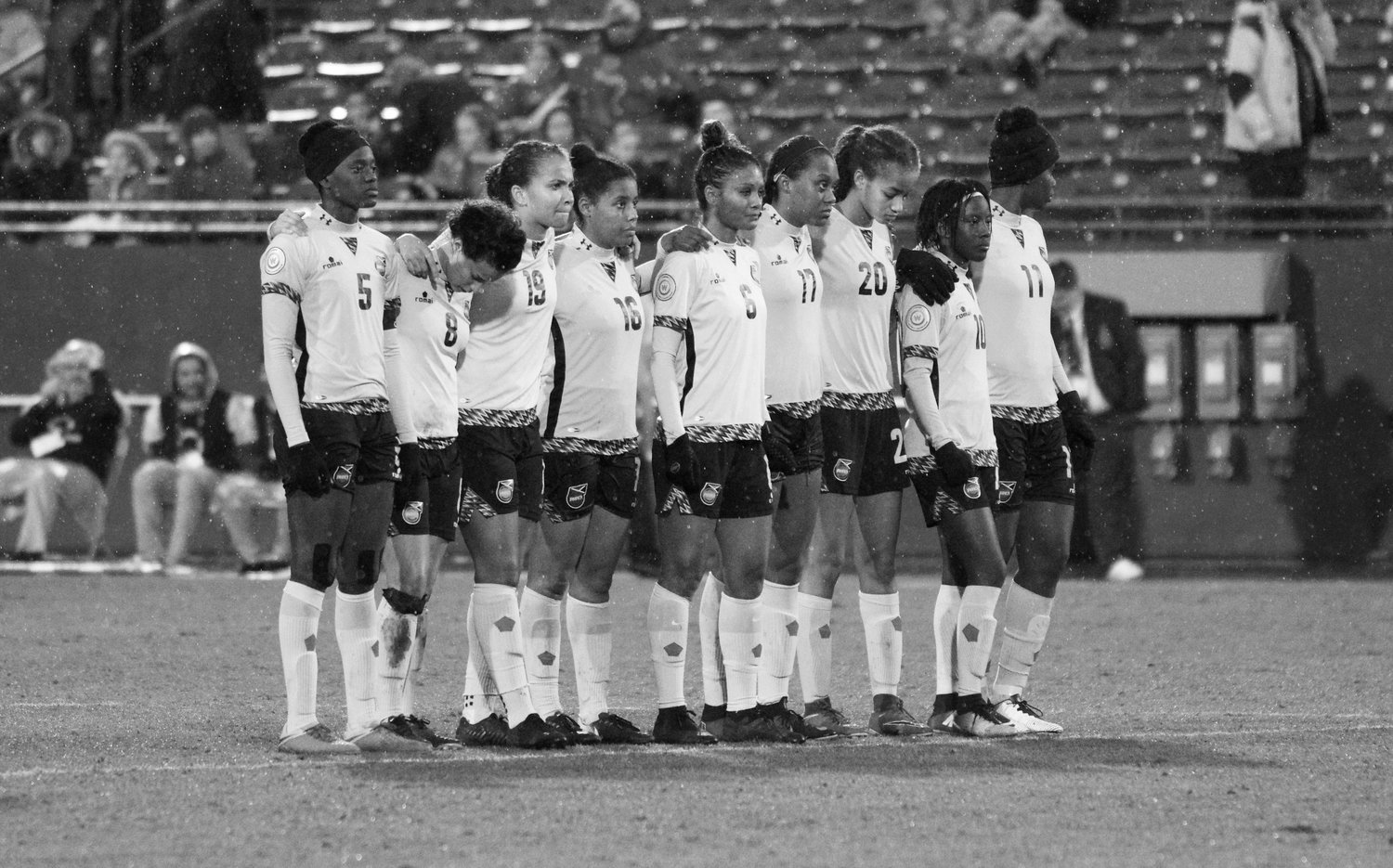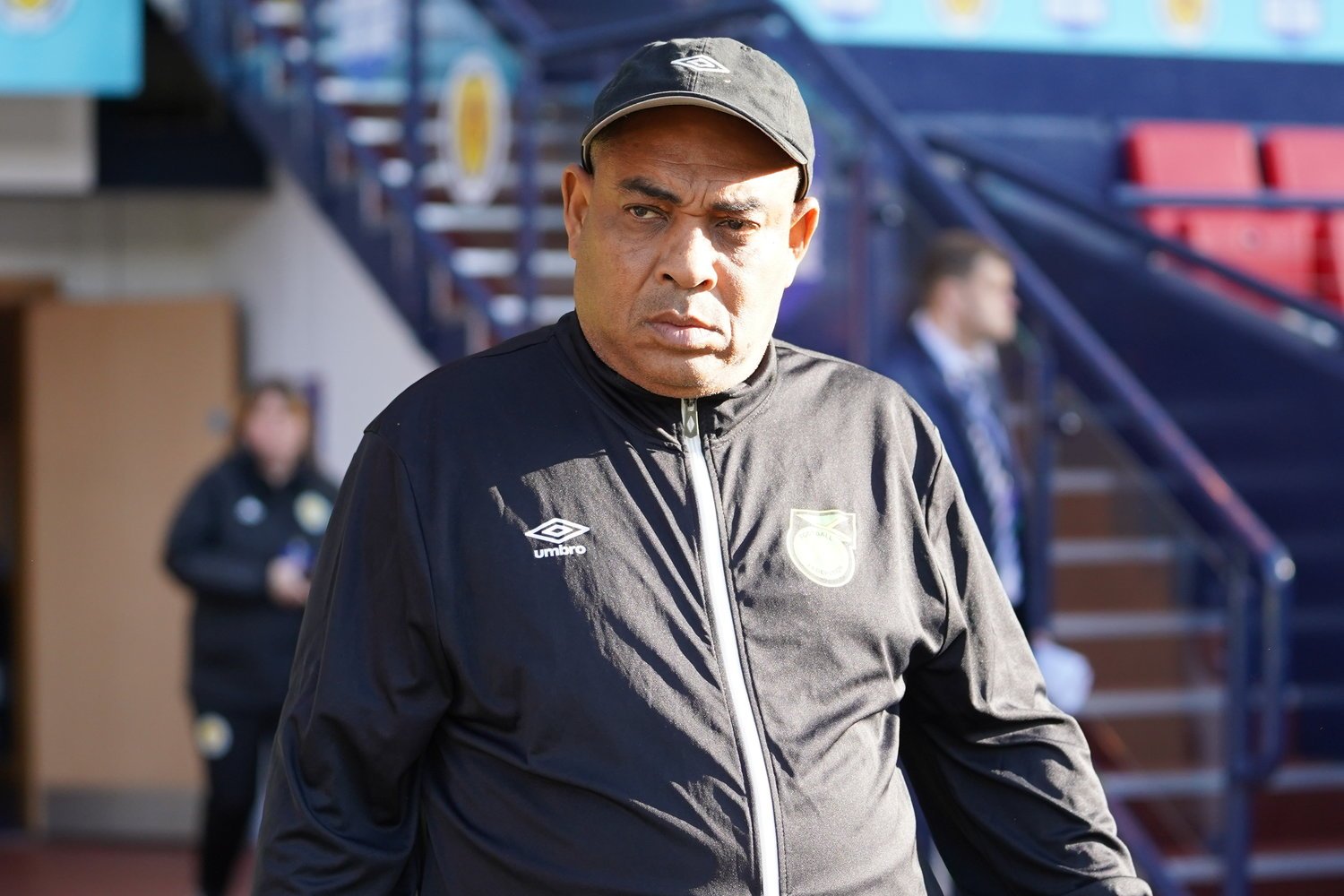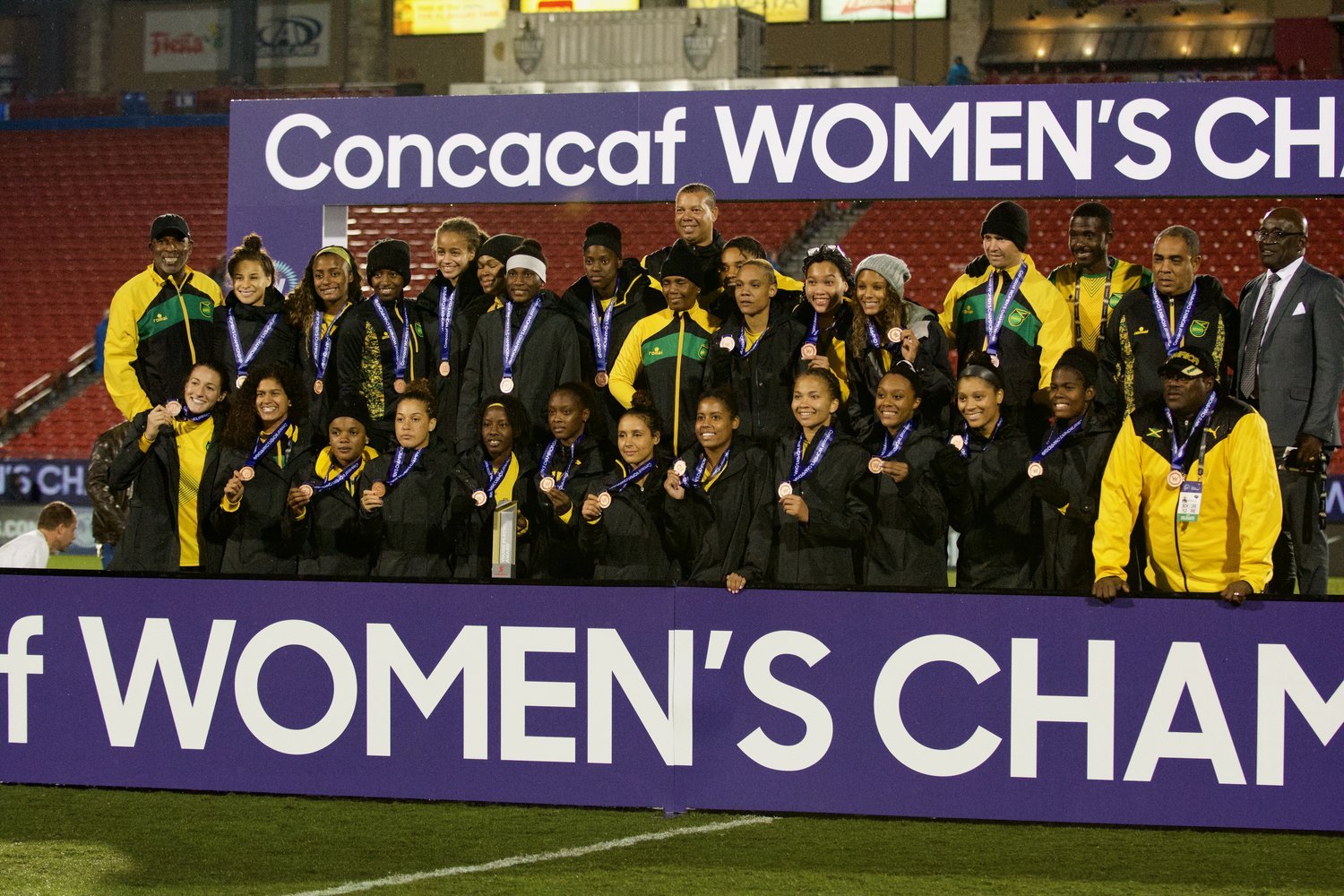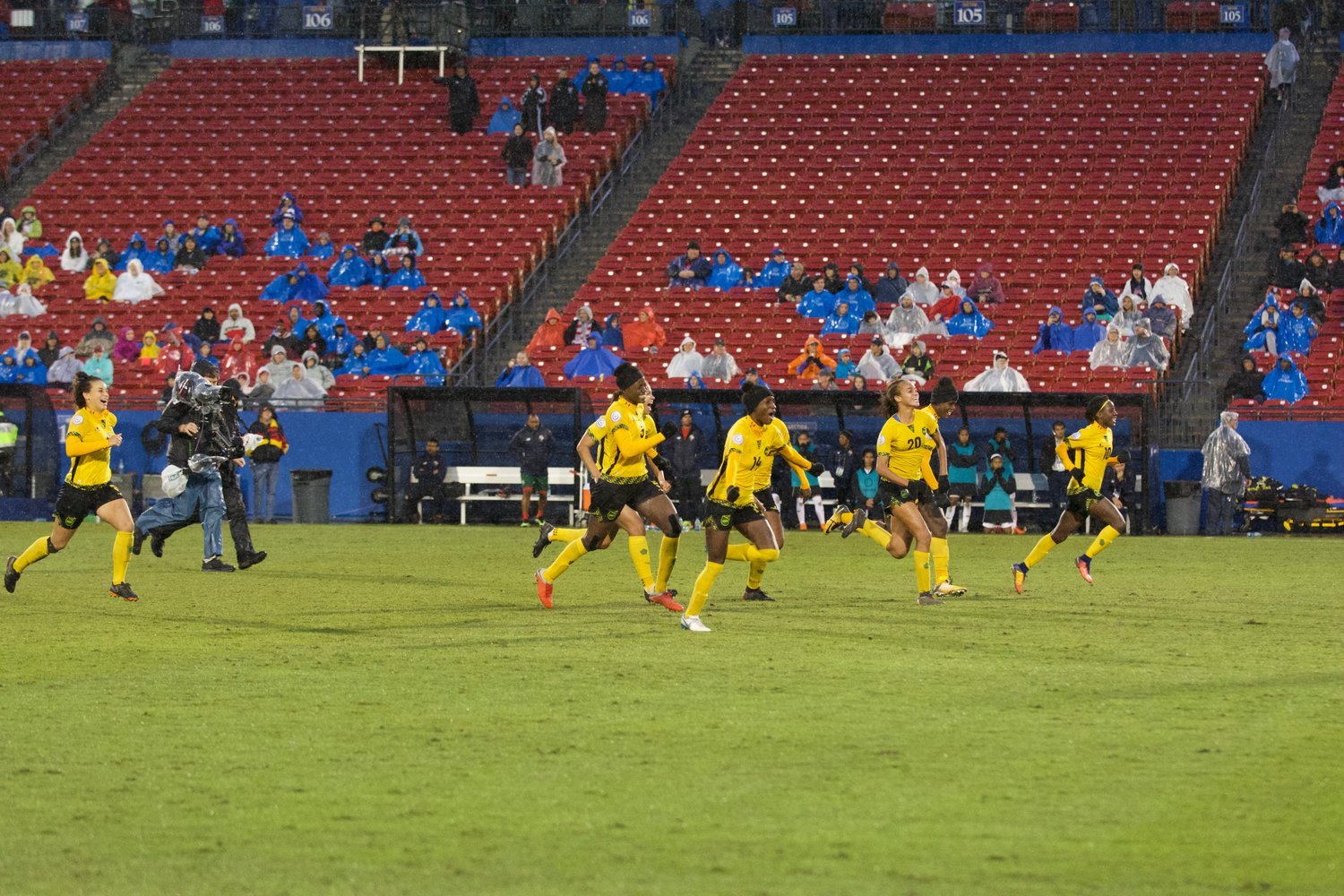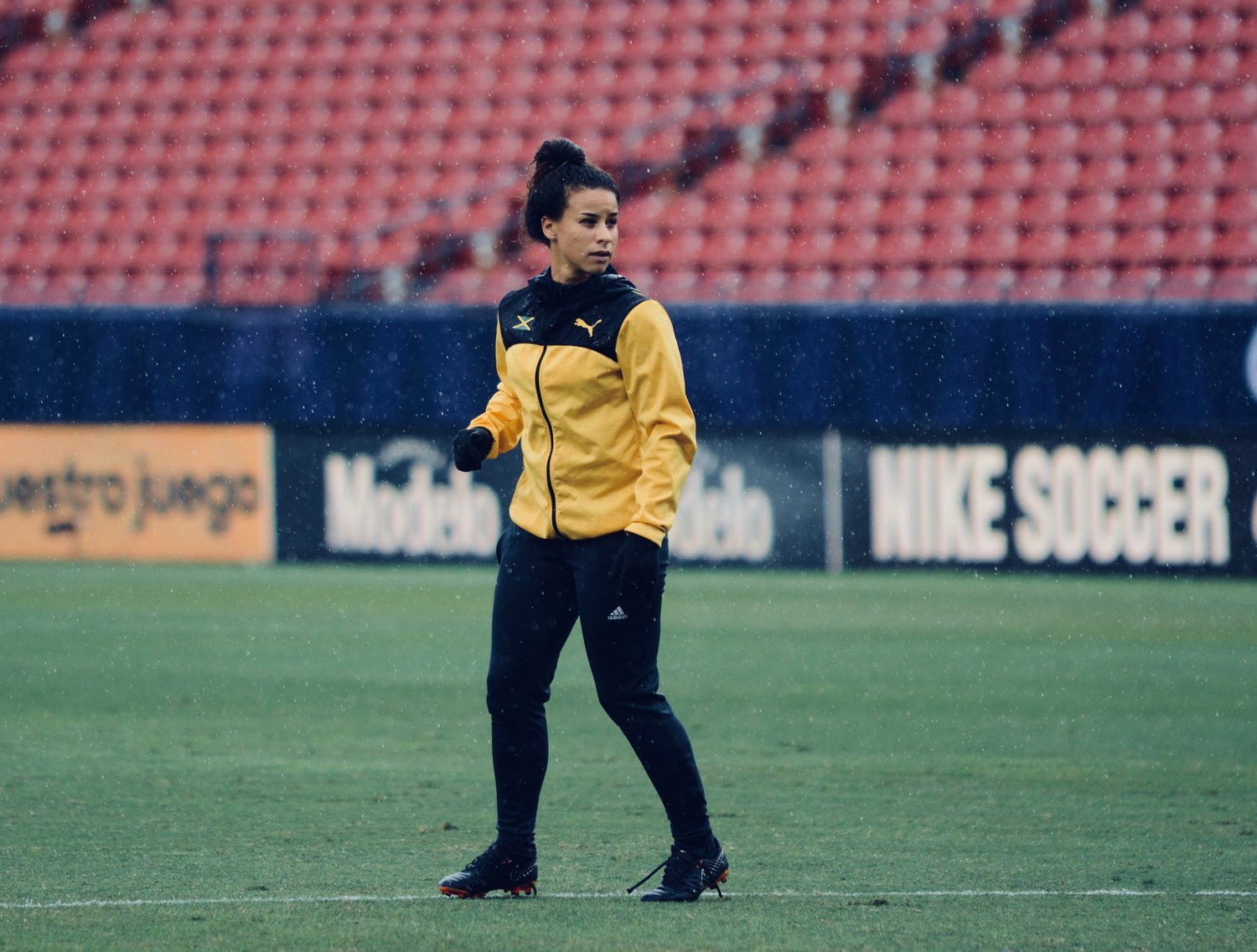Out of Many, A Team Charged to Change the Perception of Sport
On Oct. 17, 2018, Jamaica became the first Carribean country to qualify a team for the Women’s World Cup. HANNAH DI LORENZO/FÚTBOL ACE PHOTO
Thirty-six feet out from Panamanian goalkeeper Yenith Bailey, nine players from the Jamaica Women’s National Team (JWNT) stood with linked arms as teammate Dominique Bond-Flasza inched toward the penalty mark.
In Vancouver, Canada, 2200 miles away from the action unfolding in Frisco, Texas, former JWNT player Kayon Davis watched on television as the penalty kicks unfolded, phone-to-ear with fellow 1999 “Reggae Girlz” compatriots.
With a ball to the net, Bond-Flasza sealed Jamaica’s third-place finish at the Oct. 17, 2018, Confederation of North, Central America and Caribbean Association Football's (CONCACAF) Women's Championship. Jamaica’s victory over Panama earned the team a spot on the 2019 FIFA Women’s World Cup roster, the first-of-its-kind qualification for a Caribbean nation.
“The only thing I thought of at the moment was, ‘Wow, we made it,' "said Davis, 40. “I was excited; I was jumping. I was screaming because this is what we have worked for all those years. From the 1960s, women have been playing in Jamaica, and each and every one have put in sacrifices and fought for it.”
The Reggae Girlz watched on in support during the penalty kick-phase of the 2018 CONCACAF Women’s Championship. HANNAH DI LORENZO/FÚTBOL ACE PHOTO
The road to qualification for the JWNT, affectionately known as the Reggae Girlz, had been rooted in adversity from the beginning. Excluding sponsorship from the Bob Marley and Alacran Foundations, the players and coaching staff were mainly self-funded. They’ve received minimal support from the Jamaican Football Federation (JFF). And in a global climate where inequality between men's and women’s football is of ongoing discussion, the Reggae Girlz and their leaders have gone unpaid for their contributions.
“The men don’t get treated as well as people think they do, but they definitely have gotten a lot more things in terms of the number of camps; opportunities to train; opportunities to have different playing options; sending players overseas, equipment [and] funding,” said Ashleigh Shim, JWNT mid-fielder. “I think it’s getting a little bit better now, but there’s a long way to go still.”
For pathfinders like Davis, the women on the senior team, and the watchful eyes of the next generation, the impact of the Reggae Girlz’ World Cup qualification delves beyond the sport of football. It calls for a societal reckoning and a cultural shift in Jamaica.
“Qualification has had a profound significance for Jamaica, an island nation that has struggled with economic instability and gender inequality for decades,” said Davis. “It has placed the spotlight on our women, female football, and the Reggae Girlz brand. These are underserved groups that have been lurking in the shadows of their male counterparts for over 50 years.”
Recruiting The Team
The Dadeland Mall branch of Villagio Ristorante is no longer standing in Miami, Florida, as it was five years ago when Cedella Marley and Hue Menzies met to discuss the Reggae Girlz’ future.
Hue Menzies, Head Coach and Technical Director of the Jamaica Women’s National Team. DANIELA PORCELLI/FÚTBOL ACE PHOTO
Since its 1990s establishment, the JWNT had atrophied from lack of funding, failed qualifications, and team disbandment. Marley, daughter of musician Bob Marley, was on a quest to revive it.
When Cedella embraced the role of JWNT ambassador and benefactor in 2014, a mutual friend suggested she seek a head coach for the Reggae Girlz in Menzies.
This wasn’t the first time that Menzies, Executive Director of the Florida Kraze Krush Soccer Club in Orlando, had received such a request. Politics and disorganization saw him turn down opportunities in the past. Cedella, however, struck a chord with a philanthropic plan of action.
“I’m a really straightforward type of person, so I think [Cedella] did some research on me; she knew what I was about before I even spoke to her,” said Menzies, Head Coach and Technical Director of the JWNT. “She [said], ‘I know you don't want to really mess with this football issue, but I'm requesting something that's going bigger than football.
‘We want to make an impact and change mindsets of people in Jamaica and how they perceive women playing football; women in general.’ That’s what caught my eye in the whole situation. I sat down with her and said, ‘You know what? If that’s your direction, then I have no problem doing it.’ ”
Menzies, 55, already had his hands full when he signed on to give consultation to the JWNT. Cedella’s second request came soon thereafter.
Ahead of the Oct. 2014, CONCACAF Women’s Championship, the Reggae Girlz needed a base for their training camp, and Cedella asked Menzies if he could host the team in Orlando for three weeks.
“I ended up having to do more than I thought,” Menzies said. “The players came in without shoes, without sports bras, without a lot of things, and we just had to provide a lot more than what we thought. So, it was pretty touching at the time; you realize it’s more than football, what you’re doing.”
In Jan. 2015, Menzies stepped into his present-day role with the JWNT. When the Reggae Girlz failed to qualify for the 2016 Summer Olympics in Rio de Janeiro (Brazil), he set out to restructure the program and give the players something to believe in.
“I thought we were getting ready to head in the right direction,” said Menzies, “but the powers that be thought they didn’t want to invest into the program anymore, so they disbanded the league.”
The Reggae Girlz stood for a podium shot following their World Cup-qualifying win against Panama in the 2018 CONCACAF Women’s Championship. HANNAH DI LORENZO/FÚTBOL ACE PHOTO
The silver lining in the league’s disbandment —which Menzies learned of through the news — was the opportunity for him to take players out of Jamaica and allocate them to universities, clubs in Europe, and other opportunities. When a phone call came in 2018, about Jamaica fielding a team for the 2019 FIFA Women’s World Cup qualifier, Menzies met the request without hesitation.
“[The players] made huge sacrifices to come up to the States and leave their families,” said Menzies. “Obviously they’re getting a good education while they’re in a pro-environment, but I didn’t want to just walk away from those kids that had made that jump. So, it was pretty easy to come back in and say, ‘All right. We'll start over, and we'll bring those players back in.' These kids, you can’t turn your back on them because of what they’ve gone through in life, the changes they made, and the impact they were making.
“The players have the right mindset, the players created the right environment,” he added. “That would be the moment where, as a team, I realized that what we’ve been doing the last two years, even though we were disbanded, was working, and it’s going to create some type of history.”
Strangers Turned Family
Menzies and team scoured Jamaica and its diaspora to create a selection pool of roughly 48 contenders. The players named to the final squad of 23 were hand-picked for varying reasons, the most important being the spirit of team comradery. True to the nature of Jamaica’s “Out of Many, One People” motto, the final selection was rich in depth, experience, and diversity.
The Reggae Girlz celebrated their win over Panama during the third-place game of the 2018 CONCACAF Women’s Championship. HANNAH DI LORENZO/FÚTBOL ACE PHOTO
There are girls like 22-year-old Khadija “Bunny” Shaw, who was part of the JWNT before the 2015 disbandment. Born in Spanish Town, Jamaica, Shaw was one of the players Menzies helped go abroad. After spending two years playing for the Eastern Florida State College (Melbourne), she transferred to the University of Tennessee’s (Knoxville) Division 1 team in 2017.
There are also players like American-born Havana Solaun, 26, who debuted on the JWNT this year.
“The thing about our culture — I [can go without talking] to you for 40 years, and then I talk to you, and it's like we never left,” said Menzies. “I think that’s the culture that we have. Due to circumstances, we just never had the opportunity of being together [as a team]. So, we’ve selected certain players that can handle those situations and have the personality to just come back in as one.”
For Ashleigh Shim, who debuted on the JWNT in 2015, moments of hardship have helped cement the team’s foundation. From their historic win against Panama, where coaches paid out of pocket for the team’s warm weather gear, to the discouraging events surrounding the May. 13 match against Haiti, “nobody,” as Shim says, “is going to be there for us like each other.”
“Haiti was really tough for us because it felt like everything was against us,” said Shim, 25, of Miami, Florida. “The food at the hotel was terrible; it was greasy and fattening, not something you would feed athletes. We would ask for alternative meals, but they didn’t change them.”
Ashleigh Shim, mid-fielder for the Jamaica Women’s National Team. HANNAH DI LORENZO/FÚTBOL ACE PHOTO
“The game against Haiti was hostile,” she continued. “People in the stands [were] yelling and hissing at you to try to get in your head. When we scored two goals, the stadium went silent; you could hear a pin drop. That was the toughest part of our journey to qualification.”
Life doesn’t stop for football, a sentiment the Reggae Girlz know better than any. Their commitment to the team comes at the sacrifice of the jobs and families they leave behind. And while the team and coaching staff signed contracts weeks ago, they have yet to be paid by the Federation.
“It definitely hasn’t been easy because I’ve been doing this a year now since the program started back again,” said Shim, owner of the South Florida-based Trained2Go Soccer Academy. “Fortunately, I have my own business, and I have three employees who can step up when I have to take leave, but it's also hard because I run everything. When I'm away, it's definitely challenging, but I just figure out how to deal with it at the end of the day.”
World Cup And Beyond
On Sunday, Jun. 9, Jamaica will make its World Cup debut in a stadium of 20,068 people. Held at the Stade des Alpes in Grenoble, France, they’ll face off against Brazil, before moving on to play Italy and Australia in the weeks coming.
No matter the outcome of their efforts, the team, as Menzies so often reminds them, have grown to become role models on and off the pitch.
“We never took this job— this project, for trophies, for the World Cup, or for anything. This is just part of the journey,” said Menzies. “We wanted to make an impact in our culture of empowering women.
“I’m a momma’s boy; my mom raised me,” he added. “My mom was a father and a mother to me, so I know the empowerment of women, and I respect it."
